8 Reasons to Use Java for Backend Development
Java is a popular programming language for backend development due to its portability, scalability, and security features. Its object-oriented programming approach allows developers to organize code into reusable objects, promoting modularity and ease of maintenance. Additionally, Java has a large and thriving ecosystem, providing access to various libraries, frameworks, and tools that can speed up the development process.
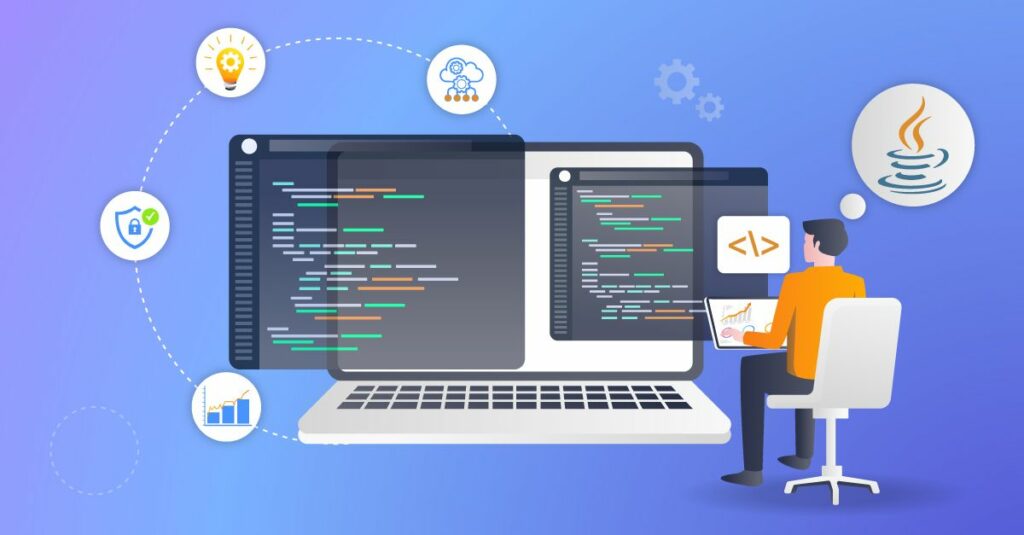
Java’s platform independence allows developers to write code once and run it anywhere, making it a versatile language for backend development. The robustness of Java makes it an ideal choice for developing secure and scalable applications that can handle large amounts of traffic. Java is widely used for developing enterprise-scale web applications, desktop applications, scientific applications, and Android applications. Some top Java frameworks for backend development include Spring, Struts, and Grails.
Java’s strengths make it a significant and popular choice for backend development projects.
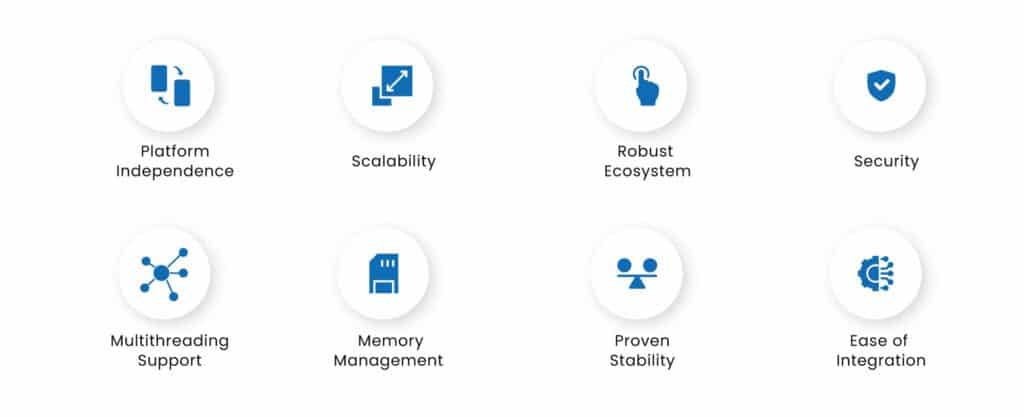
1. Platform Independence :
Java offers a significant advantage for backend development due to its platform independence. The Java programming language follows the principle of “write once, run anywhere.” This means code written for one platform can be executed on any other platform with a Java Virtual Machine (JVM). It allows for easy portability of Java programs across different systems.
This feature enables developers to create a single codebase applicable to many platforms. It eliminates the necessity for platform-specific adjustments or alterations. As a result, Java promotes code portability and reduces the need for tedious platform-specific modifications. This facilitates the development process.
The JVM makes Java code work on different operating systems. It acts as a bridge between Java and the operating system. After compiling Java code, developers can execute bytecode on any system with a compatible JVM.
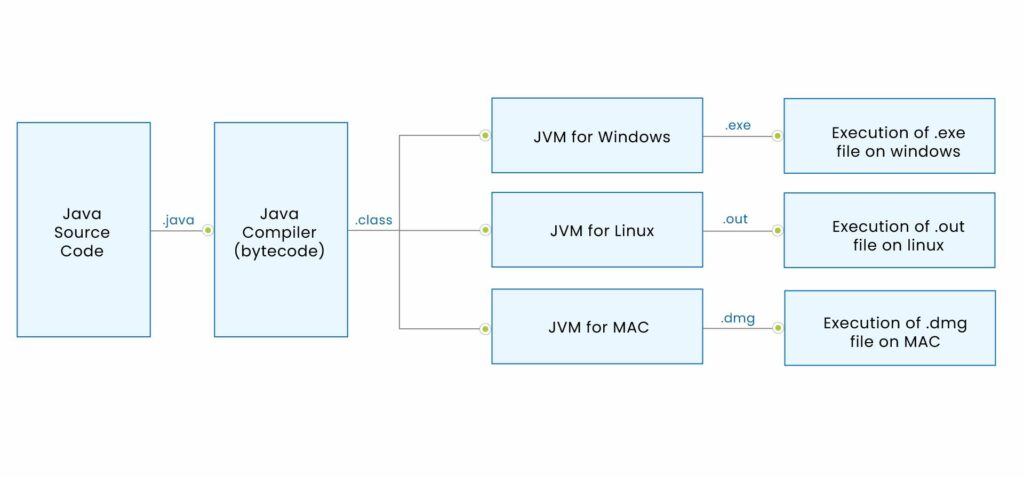
Java is widely chosen for backend development due to its platform independence.
It is famous for large-scale applications that need to run on various platforms. Developers can create easier-to-maintain, deploy, and scale applications with Java. Java reduces the need for writing platform-specific code, saving time and effort.
2. Scalability :
One key factor contributing to Java’s scalability is its multithreading capabilities. In particular, Java applications can use multiple threads, which help to utilize multi-core processors efficiently. This is because distributing workloads across threads enhances efficiency. As a result, this can help improve the system’s performance and reduce response times, even under heavy loads.
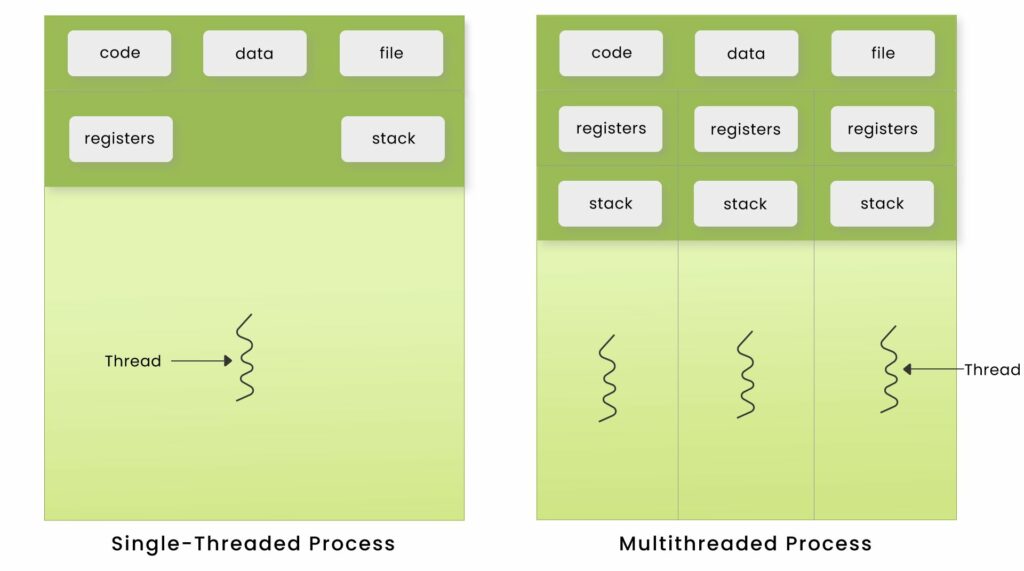
Java also provides frameworks and tools for building distributed systems, such as Java RMI, JMS, and Hadoop. These frameworks help developers create systems that work on multiple machines and environments. They make it easier to handle large amounts of data and traffic.
Java is great for handling large amounts of data, processing transactions, and managing high traffic in backend systems. It supports multithreading and memory management. This helps developers create robust and scalable systems. Java’s distributed computing frameworks make it even better for handling cloud-based applications and services.
3. Robust Ecosystem :
One of the primary reasons for Java’s popularity is its robust ecosystem. Java has been around for a long time and is widely used by organizations.
It is a stable and mature language. This stability is vital for long-term support in enterprise environments. Reliability and maintenance are critical factors in enterprise software. Java has a large and active community provides developers with support, guidance, and resources. This community has individual developers and big companies like Oracle, IBM, and Google. They all work on Java development.
Java’s robust ecosystem, abundant libraries and frameworks, and active and supportive community make it an excellent choice for backend development. With these advantages, developers can create reliable and efficient software that meets the needs of their clients and end-users.
4. Security :

One of the main reasons for this is Java’s robust security features, which are built into the language itself. Java has security mechanisms to protect applications from attacks and vulnerabilities. One of these mechanisms is a robust system that prevents common programming errors that could cause security issues. Java’s memory management system also includes features like garbage collection, which helps prevent memory leaks and other vulnerabilities.
Java regularly gets updates and security fixes from Oracle, the company behind its development. These updates help ensure that Java remains a secure and reliable platform for building backend systems.
Java’s built-in security features and regular updates make it a popular choice for backend development. These features help developers build secure and reliable applications that meet modern computing environment demands. Java’s security mechanisms help developers create secure applications that safeguard sensitive data. These mechanisms provide a stable foundation for business operations.
5. Multithreading Support :
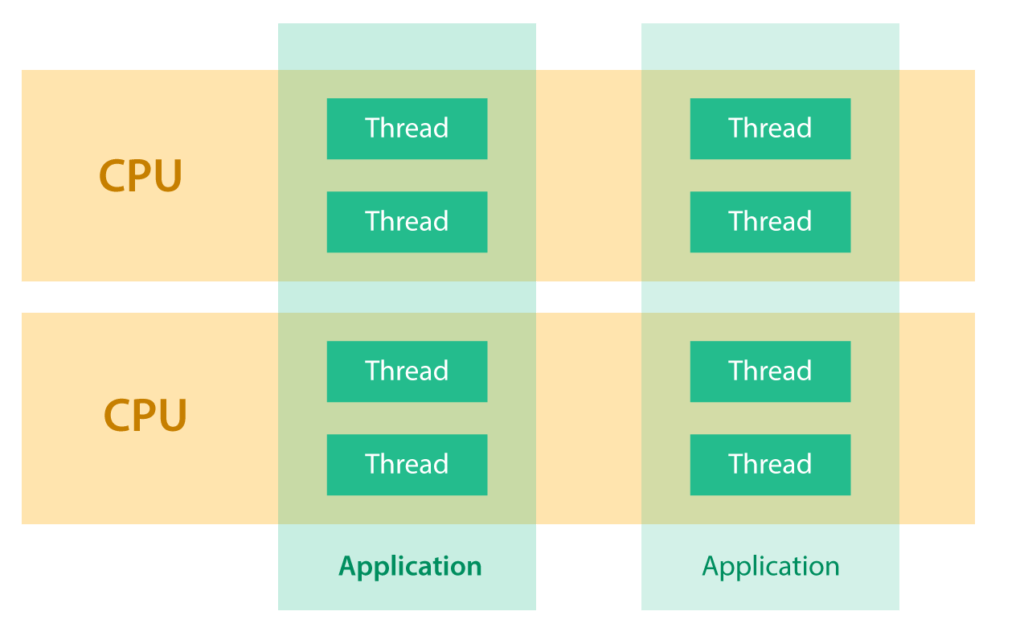
Multithreading is a technique used to execute many threads simultaneously within a single process. In Java, you can use multithreading to have your program perform multiple tasks simultaneously. It prevents your application from becoming slow or unresponsive when much work is needed.
Multithreading is particularly useful in backend development, where your program may need to handle many requests simultaneously. Java provides built-in features that simplify the creation and management of multiple threads. Developers can create responsive, scalable, and efficient backend systems. With Java’s multithreading capabilities, Java’s improved application performance significantly benefits backend development. Java’s object-oriented design and advanced programming features enable developers to write more maintainable and scalable code. Java’s JIT compilation improves performance by optimizing code execution in real-time. This boosts speed and efficiency.
Java is great for backend development. It’s vital in multithreading, using system resources efficiently, and boosting application performance. These advantages help developers create responsive, scalable, efficient backend systems. They handle many requests simultaneously while maintaining performance and reliability.
6. Memory Management :
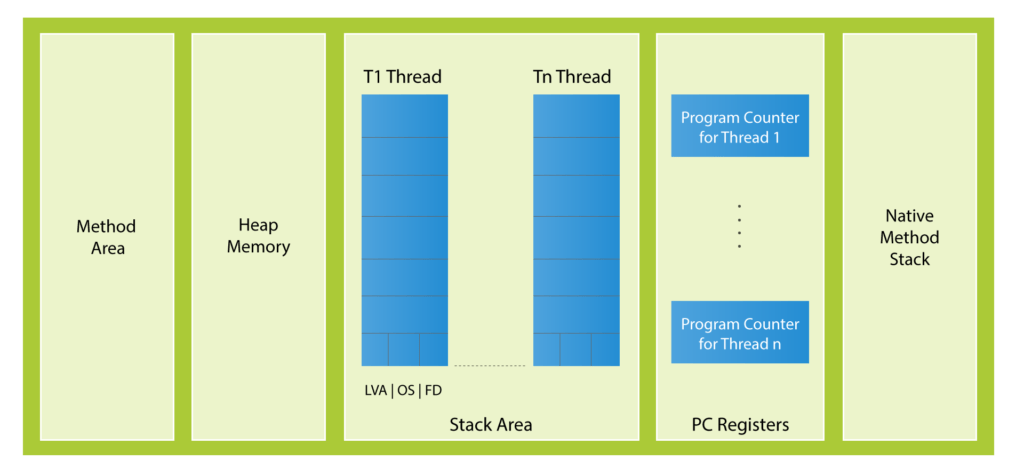
Java has an automatic memory management system called garbage collection. It helps developers avoid problems like memory leaks and segmentation faults. Garbage collection in Java frees up memory automatically when the program no longer needs it.
Automatic garbage collection is an essential feature of Java’s memory management system. It relieves developers from manually managing memory and dealing with everyday issues like memory leaks.
Java’s garbage collector runs in the background and monitors the program’s memory usage. When a computer program realizes it doesn’t need something anymore, it automatically releases the memory it used. This memory is then free to use by other program parts.
Java’s memory management system, including automatic garbage collection, offers significant benefits for backend development. The system helps developers manage memory easily and build suitable applications. Java’s standard library and object-oriented programming make it fast and simple to build complex apps.
7. Proven Stability :
Java has proven stable and reliable for backend development, making it a popular choice for enterprise applications. Java has been around for a long time, and it is a popular language. Many people use it, and many tools and resources are available. Java has been updated many times to make it better for developers and businesses.
The widespread adoption of Java in enterprise applications makes it a trusted choice for many organizations. Lots of important companies and organizations use Java for their critical systems. These systems are used for money transactions, healthcare, and government services. This widespread adoption is a testament to Java’s ability to handle complex and demanding workloads while maintaining stability and security.
Java is a dependable and longstanding programming language. It’s popular in businesses and widely used. Developers who use Java for backend development can create robust applications that meet modern business needs. Java can adapt and work on different computer systems.
8. Ease of Integration :
Java’s ease of integration and compatibility with various APIs and tools makes it a top choice for backend development. Java is a language that programmers use to create software. It works well with other technologies. It has helpful tools called libraries and frameworks that make it easier for developers to connect their applications.
Java’s compatibility with different platforms and databases allows developers to connect their applications to various systems. This flexibility means that Java applications can communicate with different APIs and tools, regardless of the technology stack they use. As a result, Java can be used to build large-scale applications that need integration with many systems.
Java’s seamless integration with other technologies makes it a valuable asset in modern development environments. Java is a programming language that can work together with valuable tools like Jenkins, Maven, and Git. These tools help automate tasks and make the development process smoother. Java can also connect with different web services, like RESTful APIs and SOAP-based services, which help integrate different systems.
Java is an excellent option for building the behind-the-scenes parts of a website or application. It’s easy to combine with other tools and software and works well with different systems. This means developers can create solid and reliable applications to discuss many things. That’s why it’s a popular choice for building modern websites and apps.
Conclusion
Java is an excellent choice for reliable and efficient backend development. Its proven stability, longstanding presence in the industry, and wide adoption in enterprise applications make it a trusted and mature language. Java is easy to use and can work well with other tools and programs. It can be used to create solid and flexible applications that can handle complicated tasks.
Java’s object-oriented programming is a flexible and scalable way to build extensive applications. It works on different platforms, so you write code once and use it anywhere, which saves time and resources. Many helpful tools are available for Java, so developers can code faster and make things easier.
Using Java for backend development can help organizations stay competitive. It provides reliability and efficiency for building robust applications. Java’s stability, compatibility, and flexibility make it a valuable asset. It allows businesses to create scalable, solid, and secure applications that meet modern needs.
Unleash the power of Java programming with Thinkitive’s expert team of developers. Take your projects to new heights by hiring our skilled Java developers through our free trial and experience unparalleled success. Hire dedicated Java developers today.




